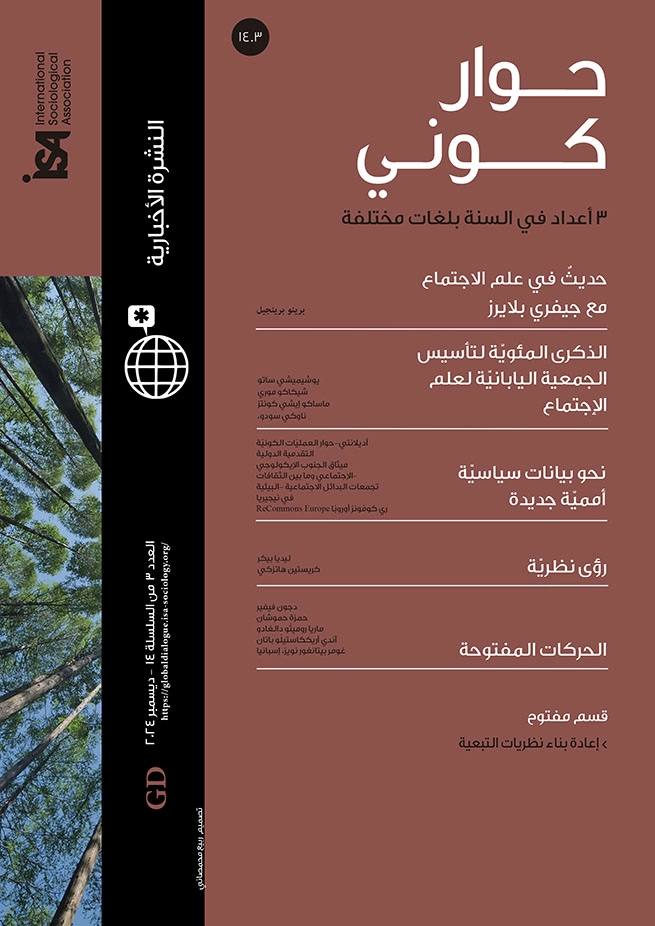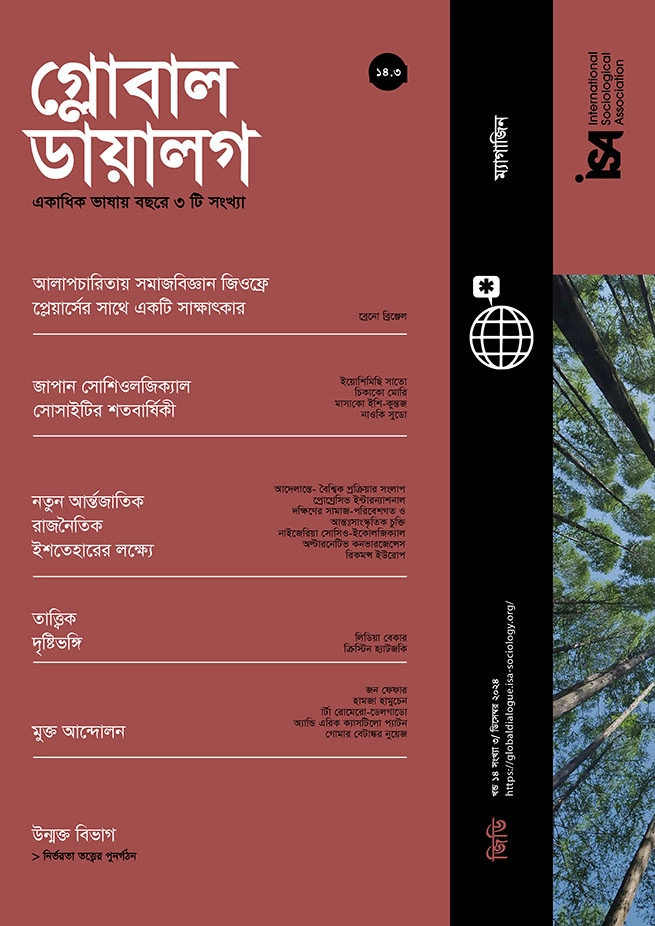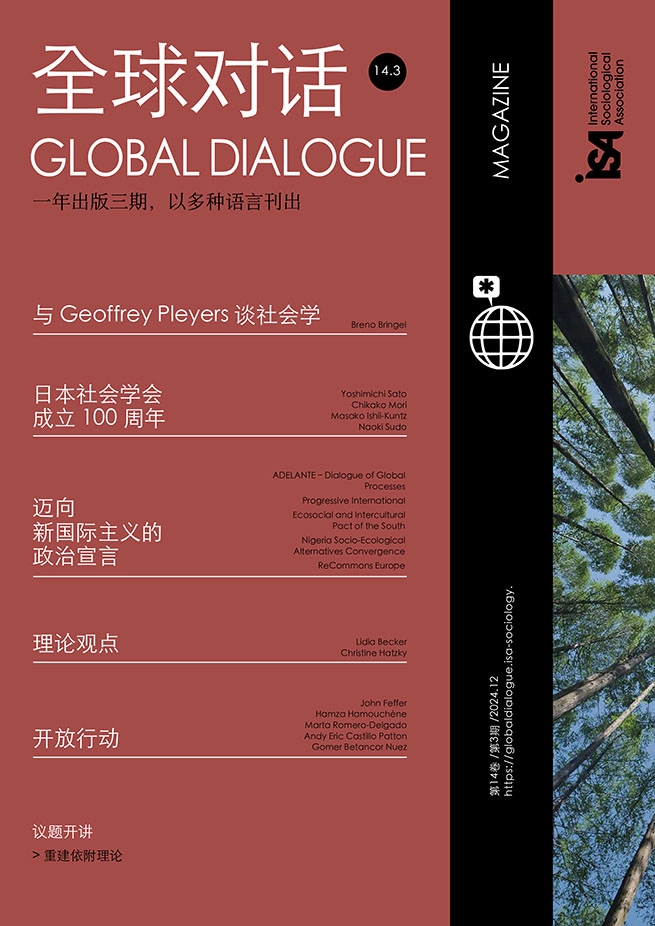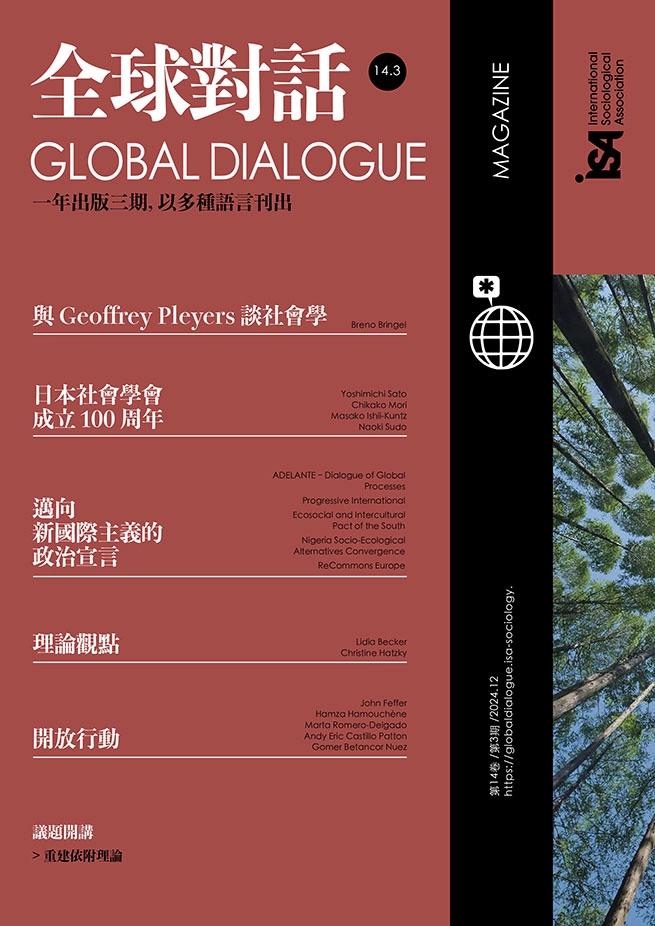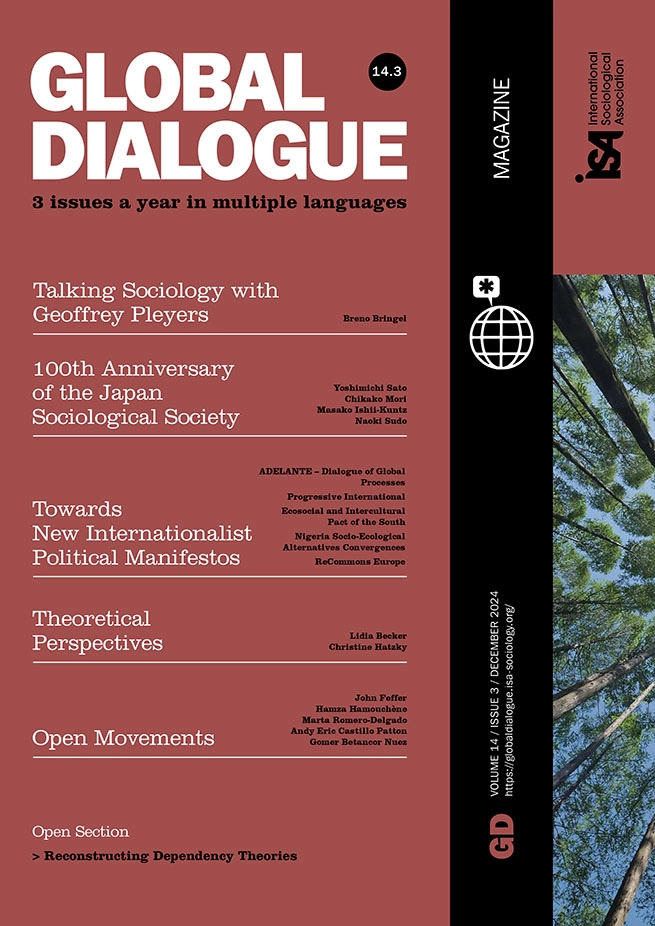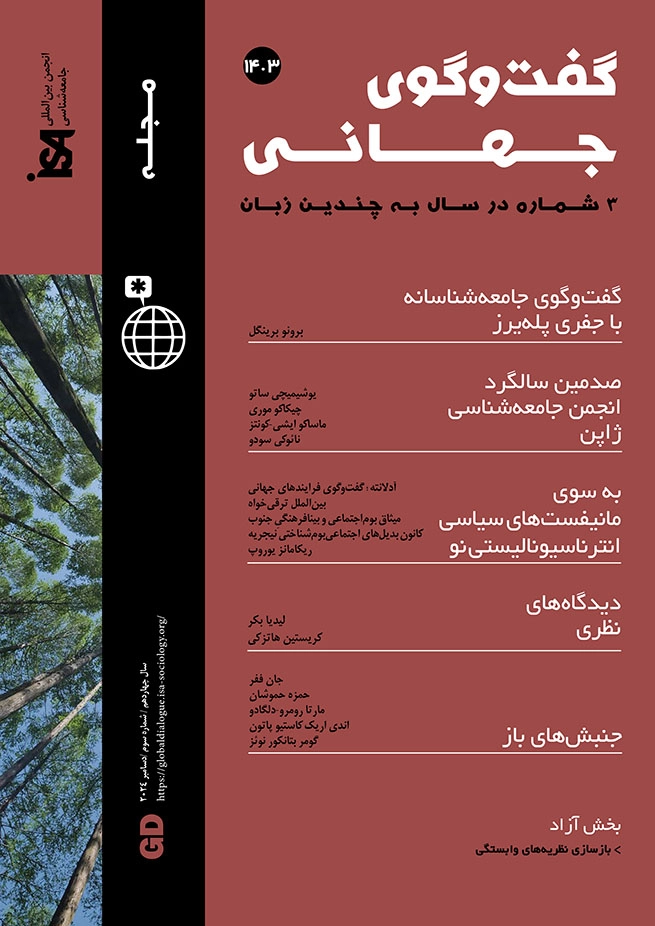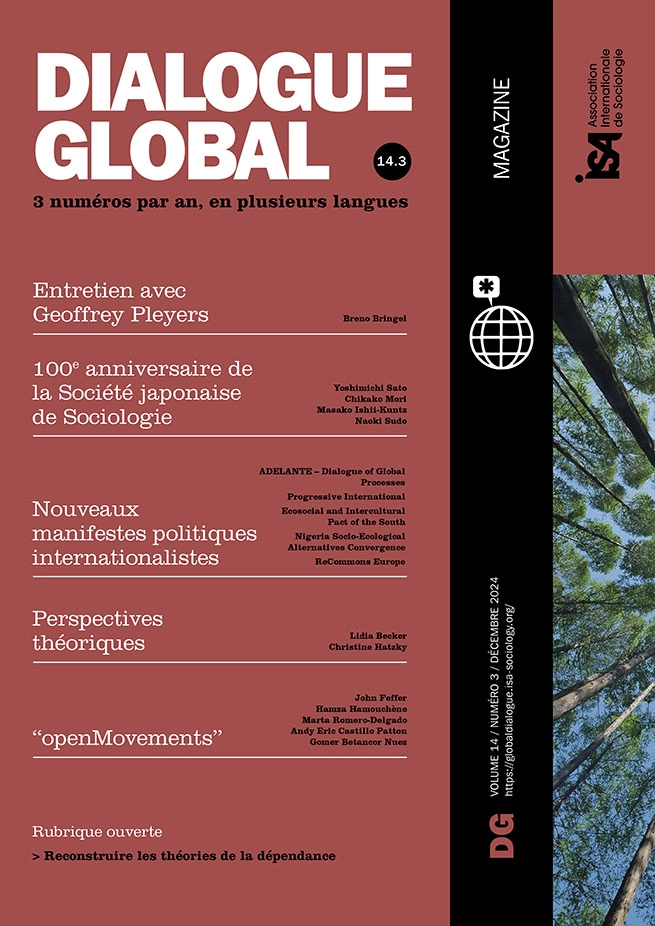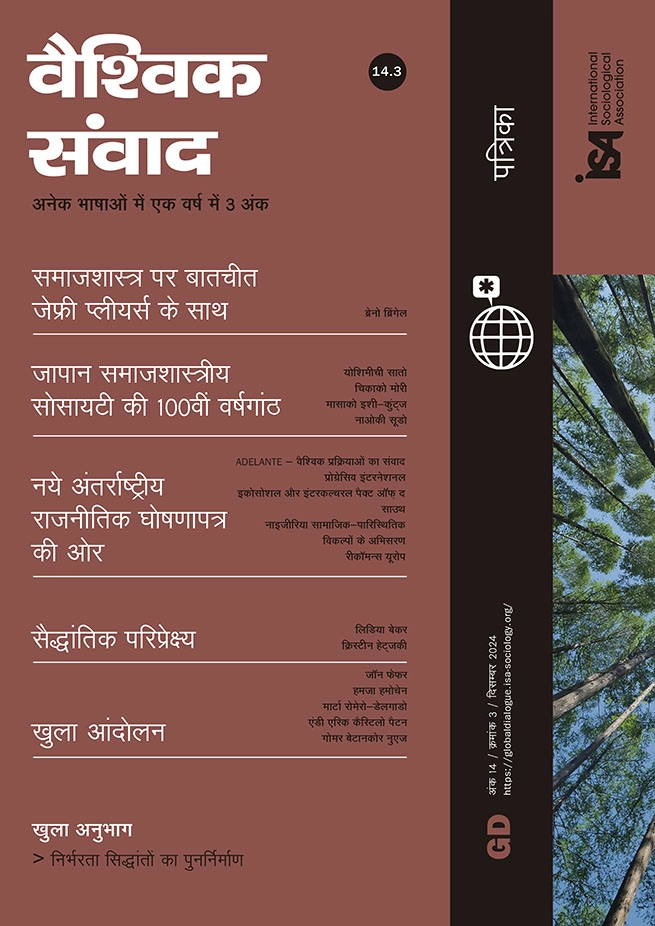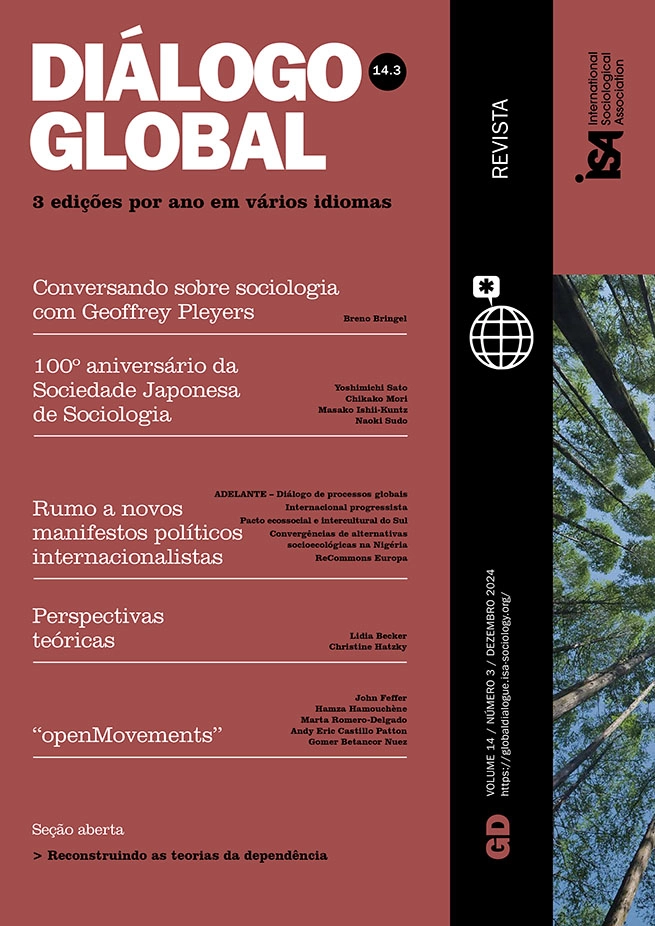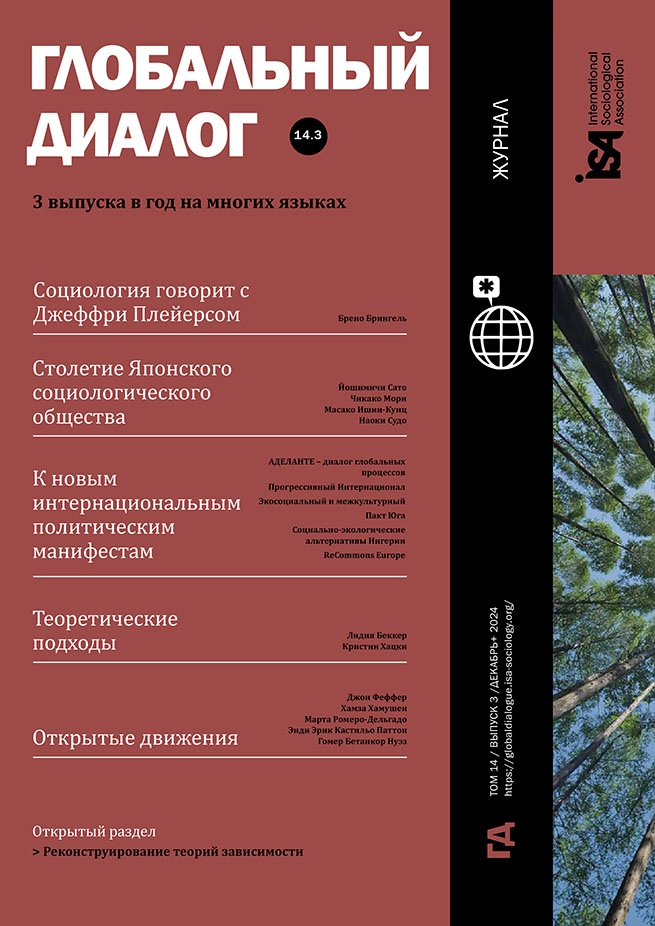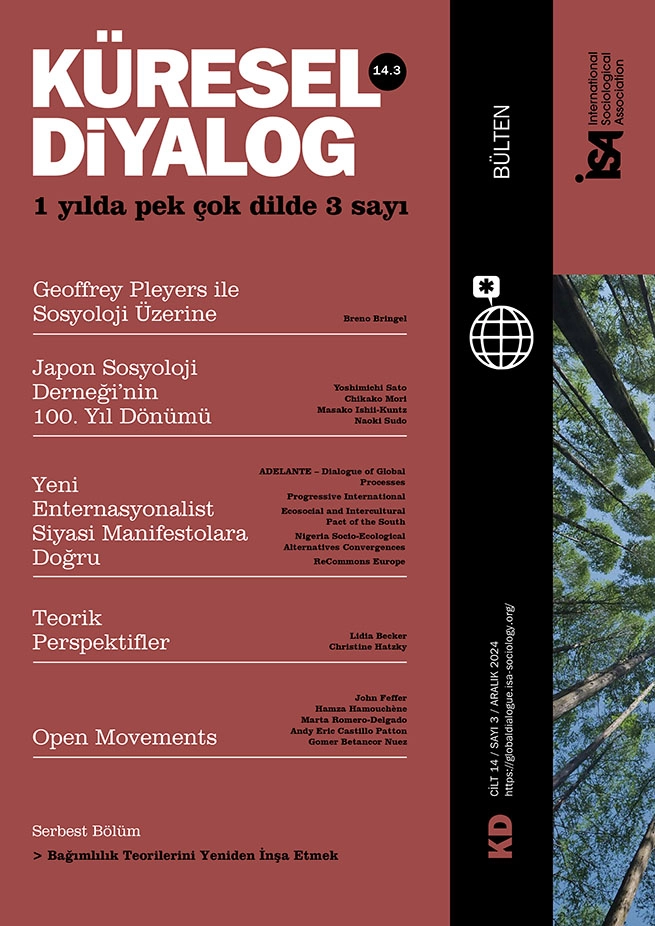Global Sociology in Times of Polycrisis: An Interview with Geoffrey Pleyers, ISA President
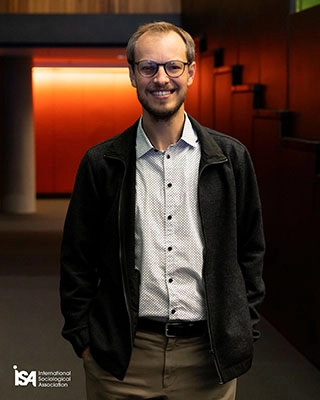
October 17, 2024
Geoffrey Pleyers is FNRS Research Director at the Catholic University of Louvain, Belgium. He has been actively involved in the International Sociological Association (ISA) since 2006. He chaired ISA Research Committee on Social Classes and Social Movements (RC47) from 2014 to 2018 and acted as ISA Vice-President for Research from 2018 to 2023. On July 2023 he was elected ISA President for 2023-27. He is interviewed here by Breno Bringel, Professor of Sociology at the State University of Rio de Janeiro, Brazil, editor of Global Dialogue and a regular collaborator with Prof. Pleyers.
Breno Bringel (BB): Social movement scholars are familiar with your contributions concerning alter-activism and global movements. However, a very relevant aspect of your work is going beyond the boundaries of a specialized field of study to rethink the links between social movements and general sociology. Based on your empirical contributions, can you tell our readers more about this perspective?
Geoffrey Pleyers (GP): Social movements are a captivating subject for studying society and social change. They are both products and producers of society. They mirror emerging changes in values and ways of living together, for example, with their innovative use of new communication tools or the process of individualization. They also attempt to transform society. They alert us to its problems and change how we see society, the world, and life together. This is true of progressive and reactionary movements that have gained influence and have managed to diffuse their worldview and values in many countries. As for social change, it is never as fast or as linear as social actors – and many sociologists – wish. This is the main argument of my latest book, Change is never linear. Social movements in polarized times (in Spanish, CLACSO, August 2024), based on analyses of the 2019 social revolt in Chile, movements and solidarity during the pandemic, and progressive and conservative religious movements in Brazil. Understanding contemporary social movements and their roles requires giving up the illusion of a simple, linear relationship between crisis and social change and between social movement action, political change, and social change. Both the enthusiasm of those who announce a radical change in society as soon as a movement emerges and the pessimism of those who reduce the outbursts to collective illusions of a minority of a people need to be qualified. Social change is a complex path that passes through the euphoria of sharing anger, dreams, and solidarity with thousands of citizens and disappointments of some electoral processes that rarely reflect the depth of social and cultural change driven by social movements.
BB: You often discuss global sociology theoretically but also practice and build it. How does the global perspective appear in your trajectory from your early research on the alter-globalization movement to your most recent work?
GP: I grew up in a village far from global cities. My parents did not have the chance to complete secondary school, and we only traveled a little. However, that village is an intercultural melting pot at the border between Belgium, the Netherlands, and Germany. Local roots and a local dialect combine with an openness to other cultures, languages, traditions, and histories.
A new life began when I moved to Paris, to the center founded by Alain Touraine and run by Michel Wieviorka. It was a stimulating international environment, with researchers from all the continents and many from Latin America. I dedicated my MA and doctoral theses to the global justice movement, or “alter-globalization”. I attended the first seven World Social Forums in Porto Alegre, Mumbai, Bamako and Nairobi. They brought together up to 180,000 activists from around the world. Since I discovered Latin America and its social movements, the dialogue with my colleagues and friends from there has remained fundamental. I learned a lot from the attempts to organize horizontally and more democratically by parts of this movement. I visited Mexico and have learned a lot from the Zapatista indigenous movement, which remains one of my main inspirations at a personal and professional level and in my role at the ISA. After my PhD, I conducted some research in Bangalore, India, and a post-doctorate at New York University. I also kept traveling and researching in Europe, notably studying the environmentalist movements and the post-2011 social movements.
BB: It seems that the imaginary of “another world is possible” has given way to another, that of “another end of the world is possible”. A new dystopian “there is no alternative” is emerging worldwide. We are facing enormous challenges, such as a civilizational polycrisis, the deterioration of democracy, the normalization of authoritarianism, the deepening of militarism and the culture of war, the climate emergency, and the overcoming of planetary limits. How do you assess this scenario?
GP: Every generation of sociologists considers that it is living at a crucial moment in history, an unprecedented crisis that will determine the future of humanity. We are no exception. We experience and analyze our times as a tangle of interconnected crises, a “polycrisis”, also interpreted as a “civilization crisis”, as Latin American scholars and the recent book you edited show. Modernity has been experienced as a succession of crises. However, this time, it is not just the future of humanity that is at stake, but our planet, too. “How to live together on a limited planet” is the core issue of this century. Sociology must help resolve it, which is why our Vice-President for Research, Allison Loconto, chose “Knowing Justice in the Anthropocene” as the theme for the Forum in Rabat in 2025, and I have proposed “Global Sociology on a Limited Planet” for the 2027 World Congress in Gwangju, South Korea.
Climate change and the destruction of nature have accelerated, but they did not start in our time. They are rooted in the way of seeing the world and organizing life and society that has improved the living standards of a large part of humanity at an unprecedented pace and to an unparalleled level. However, this success of modernity has destroyed nature. Despite the increasing climate emergency, we keep destroying it at an accelerated pace. We face a historic responsibility as a series of thresholds and points of no return are crossed, shattering the balance of natural cycles with consequences for centuries to come. And yet, individually and collectively, we continue to live as if this was not the case. There are few drivers for a change that is so urgently needed.
Actually, in many realms, we seem to be heading in the opposite direction, with the rise of authoritarianism, racism, wars, and reactionary actors moved by polarized visions of the world and even a backlash against ecology and the timid measures that have been taken. The rise of authoritarianism also threatens social sciences. I am deeply concerned about the threats against academic freedom. Every week, we are informed about sociologists who have been threatened, suspended, or repressed because of their research, their criticisms of a nationalist leader, or for setting the war in Gaza in its historical and geopolitical context. It is urgent to organize ourselves better, support our colleagues, and request that governments protect (and in many cases stop attacking) academic freedom and stop targeting sociologists and scientists.
Threats to academic freedom also come from some actors within academia. We demand that every university, foundation, and institution active in the social sciences stop discriminating against colleagues who conduct research on specific topics or with some populations or who express their opposition to war, violence, and repression.
BB: This is a bleak scenario.
GP: Yes, but this is only part of the picture. At the same time, in different regions of the world, we witness promising social, economic, and political innovations: the mobilizations and concrete actions of a “climate generation”, and, on a longer time scale, the rise of a global consciousness and a different relationship with the world, with ourselves, and with nature – of which we are a part.
We live in complex times, in a more closely interconnected world on many levels, notably via the digital world, a global economic and financial system, and the influence of a few thousand super-rich who concentrate a growing share of wealth. The increasing interdependence also results from the worldwide impact of contamination, greenhouse gas emissions, and the destruction of nature.
BB: How do you see the role of sociology in the face of these challenges, the emerging dark scenario, and this polycrisis?
GP: The world’s transformations over the past decades and the rise of new critical perspectives have profoundly shaken sociology. The discipline was founded at the heart of industrial modernity when nature and economic growth seemed limitless, nation-states were consolidated, and White Western men were thought to be leading world history. They were, for sure, leading sociology and their way of thinking about the world has remained rooted in many of our concepts and theories.
Does this mean that sociology is in crisis? The crisis of sociology has been repeated endlessly since the 1970s. Reading and meeting sociologists from different continents, I have the exact opposite impression: I believe we live in extraordinary times for sociology. Since the beginning of the century, our discipline has undergone significant transformations that have regenerated it. The main developments have come from a greater openness of the discipline to critical perspectives that emerged at the border of the discipline or aside from it, often with a critical stance against it. In the past decades, sociology has become more open to these critical perspectives; it has opened more space for dialogue with different thoughts, studies, geographical areas, and theories, resulting in critical but fruitful dialogues and new ways of thinking about the world and sociology. Thanks to the contributions of feminist and intersectional approaches, subaltern, post- and decolonial studies, and Southern perspectives and epistemologies, new dialogues have opened up, and new voices have been heard. These dialogues have had a transformative impact. We have revisited the history of our discipline, its canons, and some of its main biases.
Much remains to be done. However, we should seize the extent of what has been achieved over the first quarter of the twenty-first century. When I was a student, the history of sociology was summed up in the contributions of a few Western scholars. Today, it is no longer possible to teach it without dedicating a session to W.E.B. Du Bois, to discuss inequalities without integrating gender and intersectional perspectives, or to present contemporary theories without referring to crucial contributions from the Global South. Acknowledging contributions and perspectives by other researchers opens different doors to revisiting our discipline, asking different questions, and, above all, having a better understanding of our world, its challenges, and alternatives that could make it fairer and more sustainable. As I mentioned in a previous issue of Global Dialogue (13.3), this recognizes essential contributions by past and current Western sociologists: “Global sociology can neither remain rooted in the Western universities and canons that presented themselves as universal nor be limited to criticism of this Western sociology.”
BB: What are some of the key issues we need to address today? Are we in a good position to do so?
GP: The rise of authoritarianism and reactionary actors, on the one hand, and climate change and ecological collapse, on the other, requires us to think about our world (and our discipline) differently and to efficiently contribute to insightful ways to tackle the challenges of our times. The task is immense. However, we also have new resources to meet this need.
The rise of the digital world and now artificial intelligence brings new challenges. It also gives us access to vast amounts of data and much more powerful analytical tools. An even more important resource is the better integration of the knowledge, analyses, and contributions by researchers from all world regions. In many ways, sociology is more open, creative, and solid than at the beginning of the century. We are better equipped to contribute to understanding the world and help meet the challenges of our time. The first part of the twenty-first century is an exciting time to be a sociologist.
BB: How can Global Dialogue contribute to overcoming these blockages?
GP: Global Dialogue is a unique platform because it allows complex issues that affect every continent to be explained in short articles based on in-depth knowledge of local realities and rigorous analysis, but accessible to an audience of researchers, students, and citizens. This is the global and public sociology we have promoted since Michael Burawoy founded the magazine.
Every issue of Global Dialogue shows us that “global” is not a scale that flies above local realities (that would be “methodological globalism”). Conversely, global sociology builds on contributions by sociologists from all regions of the world.

